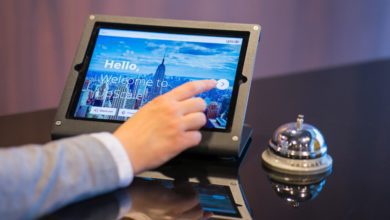How hotels can benefit from Social Wifi

Q: I’ve been approached by a company offering ‘Social Wifi’ which I have never heard of before. They claim I’ll get all sorts of marketing and data benefits. Have you used this before, and what are your thoughts?
A: Absolutely. ‘Social Wifi’ is brilliant, and there are loads of benefits for your hotel. The key is not to waste money if you aren’t going to use it properly.
What is social WiFi?
Often referred to as ‘guest Wifi’, this is a Wifi platform set-up, which lets you:
- Offer your guests free Wifi in your public areas, and potentially the bedrooms too. This is perfect for the guest experience. I know many hotels already have this facility, but getting your IT company to set up a ‘public’ sector of your existing internet provision, does not take advantage of the extra benefits created by having social Wifi, including:
- Require them to login. The login may seem counter to guest experience, however the very small inconvenience for your guest is far outweighed by two core benefits for the hotel:
- Access to data – by encouraging them to sign-up with the email, or login with their social media account, you capture data that you can market to, which you might not otherwise obtain. What data you capture will vary according to the supplier you have chosen. However, via their portals, you will be able to obtain marketing consent at the time of sign-up, and then you’re free to market to them as part of your database. Don’t forget, not all your ‘guests’ will actually be staying with you, so you have the potential to capture the data for meeting delegates, people who use the bar or restaurant and even people in the vicinity who can pick up your signal.
-
- Legal protection – this is perhaps the single biggest benefit to offering WiFi that needs a login, and is usually the least valued. You cannot control what your guests do on your Wifi, and there is the potential for them to stream, download or share information which has a copyright. If they do this on a ‘public’ portal, which they access with a password, then the hotel will be unable to prove who shared the content and therefore you will be liable for any fines, sanctions and legal disputes. By having a login, specific activities will be logged against each user, and should the worse happen, you will be able to ask your provider to confirm exactly which guest is responsible. I have seen copyright infringement cases with fines of thousands of pounds, all easily avoided with a login.
- Branded portals – the guest needs to login and therefore they need a website landing page through which they complete said login. This page will be yours to control and can be changed on a whim so you can run real-time offers that last only a short time, add repeat visit marketing messages and even promote what’s new in the hotel. All guests will see this when they go to login, so it’s a powerful, real-time messaging board.
- Some suppliers will offer the opportunity to trigger push notifications to a logged-in user. Push notifications are messages which appear on screen at a specific time, and can be released when someone has been connected for a set-length of time e.g. two hours, or can be time bound in another way for example Tuesday 10th at 10am. This allows you to send real-time messages to a user who is actively logged in, and I have seen this used to great effect to sell coffee and cake for elevenses for example.
- Restrict traffic and usage. On a traditional Wifi set-up, the actions of one user can significantly impact on the speed for another. For example, if one user is streaming, another will experience slower than normal speeds while trying to send an email. These guest Wifi set-ups allow you to manage not only the maximum bandwidth a user can use at any one time, but also the maximum data they can use within a given period without paying for more. This will vary per supplier, so check the small print.
General tips
If I’ve convinced you of the benefits of introducing this kind of portal, then you need to think about the specifics for your business. Look at the costs of each platform, the installation requirements and lead time, the data costs and restrictions, what you can and cannot do with the portal, and of course who ‘owns’ the data and has the right to market to it (it should be you).
Importantly, you also need to get the sign-up questions right; don’t just ask for their name or email. Think about capturing their reasons for the visit for example, or their home postcode. This will help you to segment the data and refine the marketing messages in the future.
Where to get it?
There are a lot of suppliers out there, some which exist specifically for ‘social Wifi’ such as ’Wireless Social’ and ‘Purple Wifi’, and some that offer this service as part of a wider offering, for example Eurolink Connect. Both have their strengths and it’s all about what you need as a business, and what they can do for you.









